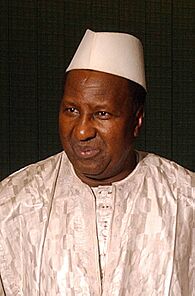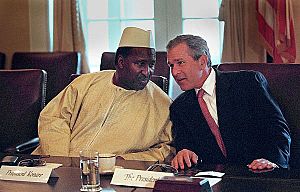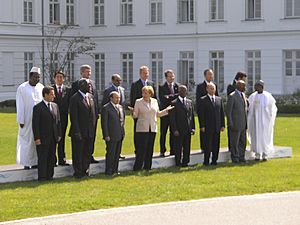Alpha Oumar Konaré facts for kids
Quick facts for kids
Alpha Oumar Konaré
|
|
|---|---|

Konaré in 2007
|
|
| 1st Chairman of the Commission of the African Union | |
| In office 16 September 2003 – 1 February 2008 |
|
| President | Gertrude Ibengwe Mongella |
| Preceded by | Amara Essy |
| Succeeded by | Jean Ping |
| 3rd President of Mali | |
| In office 8 June 1992 – 8 June 2002 |
|
| Preceded by | Amadou Toumani Touré (acting) |
| Succeeded by | Amadou Toumani Touré |
| Personal details | |
| Born | 2 February 1946 Kayes, French Sudan |
| Nationality | Malian |
| Political party | ADEMA-PASJ |
| Spouse | Adame Ba Konaré |
| Alma mater | University of Warsaw, Graduate Institute of International and Development Studies |
| Profession | Tutor, teacher, researcher, professor, historian and archaeologist |
Alpha Oumar Konaré (born 2 February 1946) is a Malian politician, professor, historian, and archaeologist. He served as the President of Mali for two terms, from 1992 to 2002. Later, he became the Chairperson of the African Union Commission from 2003 to 2008.
Contents
Early Life and Education
Alpha Oumar Konaré was born in Kayes, Mali. He was the fourth son of a Fula homemaker. He attended primary school in Kayes.
He continued his studies at several schools, including the Lycée Terrasson des Fougères in Bamako. He studied history at the École Normale Supérieure of Bamako from 1965 to 1969. He also studied at the University of Warsaw in Poland between 1971 and 1975. Later, he attended the Graduate Institute of International and Development Studies in Switzerland.
A Career in Learning and History
Konaré started his career as a tutor in Kayes. He then became a teacher at high schools in Markala and Bamako. In 1974, he worked as a researcher at the Institut des Sciences Humaines du Mali. From 1975 to 1978, he was in charge of historic heritage and ethnography for the Ministry of Youth, Sports, Arts, and Culture.
In 1980, he became a researcher and a professor of History and Geography. He led several professional groups, including the Association of Historians and Geographers of Mali. He also led the West African Association of Archaeologists. Between 1981 and 1992, Konaré worked as a consultant for United Nations Educational, Scientific and Cultural Organization (UNESCO). He also consulted for the United Nations Development Programme (UNDP). From 1989 to 1992, he was the president of ICOM (International Council of Museums).
Getting Involved in Politics
Konaré became involved in politics when he was just twenty years old. In 1967, he was elected Secretary General of a student political group.
After a change in government led by General Moussa Traoré, Konaré joined a secret political group called the Malian Party for Work. In 1978, he accepted a role in Moussa Traoré's government. He became the Minister of Youth, Sports, Arts, and Culture. He resigned in 1980. During his time as minister, many Malian sports organizations were created.
He later started a cultural magazine called "Jamana" in 1983. In 1989, he founded the daily newspaper Les échos. In 1991, he started "Radio Bamakan," which was Mali's first free radio station.
Leading Mali: President Konaré

In 1990, Konaré helped create a large movement called the Alliance for Democracy in Mali (ADEMA). This group brought together different organizations that were against the government at the time. After the government changed in 1991, Konaré helped turn ADEMA into an official political party, ADEMA/PASJ.
In 1992, he was elected as Mali's first president chosen by the people. He won with 69.01% of the votes. He was re-elected for a second term in the 1997 presidential election. He officially began his second term on 8 June 1997.
During his time as president, Konaré worked to bring back democracy to Mali. He also managed a conflict in the northern part of the country. He worked to give more power to local governments. However, there were still challenges with corruption during his administration.
Konaré honored Mali's first president, Modibo Keïta, by creating a memorial for him. He was against the death penalty. In 2002, he changed the death sentences of Moussa Traoré and his wife to life in prison. He is also remembered for bringing the African Cup of Nations, a major football tournament, to Mali in 2002.
On the world stage, Konaré worked for peace and cooperation in West Africa. He served as president of the Economic Community of West African States (ECOWAS) in 1999. He also led the West African Monetary Union (UEMOA) in 2000.
After the Presidency
The constitution limited Konaré to two presidential terms. He left office in 2002, and Amadou Toumani Touré became the next president. Konaré is the only Malian president to have left office at the end of his term.
On 10 July 2003, he was chosen as the Chairman of the Commission of the African Union (AU). This happened at a meeting in Maputo. He was the only candidate for the position. He served in this role until 2008.
In September 2021, Alpha Oumar Konaré was hospitalized in Morocco.
See also
 In Spanish: Alpha Oumar Konaré para niños
In Spanish: Alpha Oumar Konaré para niños


